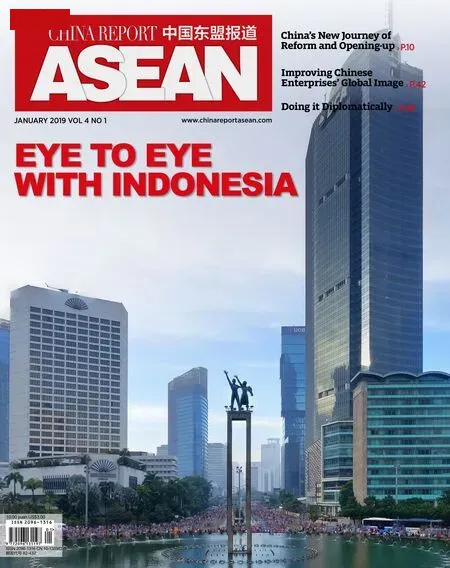TOURISM BRINGING PEOPLE TOGETHER Fourth Maritime Silk Road International Tourism Festival in ‘Hot Springs’ city
By Si Thu Tun
Humid air awaited my arrival at Fuzhou Changle Airport.Upon emerging from the airport, I found myself overwhelmed by mountains embracing Fuzhou. I also couldn’t help but notice roots hanging to the ground from the branches of banyan trees on either side of the streets. These trees are notorious for roots penetrating walls of buildings, but it was impressive to see the trees maintained systematically. Along with neatand-tidy roads, the city boasts new buildings in modern designs,creating a singular vibe.
Land of Fortune
Fuzhou, the capital of southeast China’s Fujian Province, is a coastal city near Hong Kong, Macau and Taiwan with geographic connections to Southeast Asia. As a large costal city with a very long coastline,Fuzhou is a popular destination for coastal tours. It is also located between Yangtze River Delta and Pearl River Delta, the two most developed river deltas in China.These factors make Fuzhou particularly attractive for public transportation infrastructure like airports, railways, subways, seaports and roads. In fact, President Xi Jinping commented, “Fuzhou is a land of fortune, and its citizens are blessed with good luck.” In Chinese,“Fu” means “good luck” and “Zhou”means “land,” so the name literally means “land of fortune.”
Statistically, forests cover approximately 57 percent of the city, which is also home to many hot springs and historical buildings as well as roads maintained in a traditional manner, crystal-clear waters, a chain of mountains,famous parks and wide roads with big trees on both sides. Due to these environmental features, Fuzhou is well-known for eco-tours. Residents are always close to the green becausesmall parks can be found everywhere near residential areas. Even the hot springs are historical—they were dubbed “dragon vein and golden soup” in ancient times. Fuzhou is indeed blessed with abundant highquality hot springs. Since the 1980s,Fuzhou’s hot springs have been celebrated as a valuable emerging energy resource and recreational usage was expanded to healthcare,agriculture, industry and heating as well as hotels and tourism. In 2010,Fuzhou was honored as China’s “Hot Springs Capital.”

Fuzhou is an ancient city with a history of over 2,200 years. Historical buildings and time-honored streets that were once famous can still be found inside the c
ity. Opera stages built inside wealthy estates also re flect past and present living styles in this city. Strolling down the historical streets, it’s easy to imagine how past residents lived long ago.Before electronic ampli fication was available, trunks and wood were used to create a sound system to amplify voices and sound from an opera stage. Thanks to such rich cultural heritage, Fuzhou is also famous for its cultural tours.
A wonderful thing about Fuzhou is that at least four million Chinese people living all over the world can trace their roots back to this land of fortune. More than 800,000 Taiwan residents recognize Fuzhou as their ancestral home, and Fuzhou hometown associations have been founded in every county of Taiwan.
Expanding Cooperation
As a city with a long coastline,Fuzhou is also popular for costal tours. Fuzhou is known for the Mawei Ship Administration,founded in 1866, which makes it the birthplace of the modern Chinese navy. Although the city was built over 2,200 years ago, primitive tribes were already inhabiting the area over 7,000 years ago. Clearly,it is an important cradle of Chinese maritime civilization.

The Fourth Maritime Silk Road (Fuzhou) International Tourism Festival kicks off at Fuzhou Strait International Conference and Exhibition Center on November 30, 2018.
In this steamy land of fortune,this year marks fourth edition of the Maritime Silk Road International Tourism Festival. As the festival’s name implies, participants include diplomats from countries along the Belt and Road, travel agency members and media representatives. This year,nearly 1,000 people attended the festival. The opening ceremony was celebrated at the Strait International Conference and Exhibition Center with performances by dancers from different countries including China.At night, the city’s famous Float Parade appeared with 10 squads of performers from countries and cities along the Maritime Silk Road.
During the event, representatives from the World Tourism Alliance and the China Newspaper Association jointly issued the Fuzhou Declaration on Strengthening the Maritime Silk Road Cooperation in Tourism Communication. The document points to the context of integrated development of cultural and tourist industries, stressing that cooperation in tourism plays an important role in strengthening connections along the route. With the Belt and Road Initiative as a platform, all involved parties should build consensus,introduce China to the world and work together to promote win-win cooperation and development of China’s tourism industry.
This festival started on November 30 and ended on the last day of 2018. The theme was “Expanding Cooperation along the Maritime Silk Road to Share a Better Life,” and the purpose was to promote tourism cooperation and cultural exchanges across borders and work together to bolster win-win cooperation in tourism among countries and regions along the Maritime Silk Road.The event also aims to showcase the development of Fujian Province and Fuzhou City through Maritime Silk Road tourism cooperation and to share promotion strategies and practice of Chinese tourism with attendees from tourism industries around the world.

